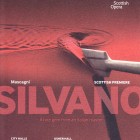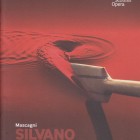Silvano 2019Scottish Opera
Read more about the opera Silvano
Scottish Opera followed up its series of concert semi-stagings of rare works in recent seasons with a real collectors' piece that has hardly been performed since its opening flourish. As before, the quality of the performance did everything possible to show Silvano in its best light. For the first time the excellent Sunday afternoon in Glasgow (on which we are reporting), greeted by a hugely enthusiastic audience, was followed by a repeat on Tuesday evening in Edinburgh.
The quality of Mascagni's orchestration is superb, and Stuart Stratford got the Orchestra of Scottish Opera playing with a wonderful sense of dramatic commitment from the first note. Although it is given the novel description as a dramma marinaresco there was perhaps less of maritime atmosphere than expected - though the introduction to the second act, with a chorus of fishermen relieved at the calm weather did have a sense of watery swell about it. The expected emotional storms were certainly evident in spades, but there was maybe less of a specific sense of the briny than, say, Verdi supplied in Simon Boccanegra.
If there was plenty of stirring stuff from the orchestra and chorus, the four soloists also had a good deal of interesting music to project, especially the soprano in turn duetting with tenor and baritone. It has to be said that extensive comparisons with Cavalleria become inevitable, however, and may well be the main reason for the work's disappearance from the general repertoire. Like Cav, the tenor has a close emotional relationship with his mother, and a conflicting one with the baritone. Unlike the earlier work, here it is the baritone who dies and the tenor who survives, admittedly making himself scarce at the end. The big difference in plot is that where Cav has two women to provide fuel for the conflict, here there is only the one, and she has more in common with Lola than with Santuzza.
The performances of all four soloists were very enjoyable. As previously in this series, they had learnt their parts by heart - an excellent example of dedication, when only two performances were promised, and it is difficult to see them being required to sing revivals in other locations. Alexey Dolgov made a great impression on his first visit, for Iolanta, and here projected the very different title role with huge enthusiasm and obvious enjoyment. Emma Bell had not worked with Scottish Opera before, having shown herself to be an excellent dramatic performer in Mozart at the Edinburgh Festival. She was just as good in this very different idiom. David Stout is more familiar, and has done fully-staged work here. He also created a tremendous sense of character. Leah-Marian Jones has worked with Scottish Opera throughout her career, and has included verismo works in concert before (Andrea Chénier and Cavalleria). This was her first appearance in the recent series - she remains a hugely valuable and versatile artist.
Given the scarcity of recordings, it is a pity that the opportunity seems to have been missed to make any kind of commercial recording, or even to broadcast it. The quality of these performances and the high reputation they have quickly achieved really should ensure some form of preservation.
During the final stages of rehearsals, the announcement of Scottish Opera's 1919/20 season revealed several more of these rare works o be planned, including two more by Mascagni - the brief, lightweight Zanetto and extremely serious and depressing Iris. To put these Mascagni novelties into context, a performance of Cavalleria has also been slotted in. Along with other unfamiliar examples of the same vintage (Leoncavallo and Wolf-Ferrari) an enterprising new season is in store.
Mascagni and Silvano
For all the years since his death, indeed during most of his lifetime, Mascagni was generally regarded as a one-hit wonder. The success of Cavalleria Rusticana far outstripped any of its successors.
In recent years, Opera Holland Park has made something of a speciality of disinterring the works not just of Mascagni, but also Leoncavallo (Zazà), Cilea (Adriana Lecouvreur), Montemezzi (L'amore dei tre re), Zandonai (Francesca da Rimini) and other Italian composers of that era.
The works by Mascagni that have resurfaced include L'amico Fritz, Zanetto and Iris, with Isabeau following in 2018. Even OHP have not yet tried Silvano, and this may have been its British premiere, as it did not reach London in the period after its launch at La Scala in 1895. It was certainly the first Scottish performance.
The text is by at least one of the collaborators on Cavalleria, and features another emotionally disastrous mix, with a novel maritime element thrown in.
It was good to hear Stuart Stratford continuing his exploration of a neglected area of the repertoire which his years at OHP have shown that he clearly loves.
Scottish Opera 2018/19
Scottish Opera's 2018/19 season started off with the company's first full-scale staging of one of the most popular works of the verismo school in Leoncavallo's Pagliacci. This was seen in Paisley in July - an impressively large-scale production with many local performers, all in a temporarily-erected tent, dubbed the 'Paisley Opera House'. The new stagings included a world premiere, Anthropocene, an eagerly awaited further collaboration between Stuart MacRae and Louise Welsh. There was also a new Kátya Kabanová. Returning to the composition period of Pagliacci, the continuing Sunday afternoon concert series included Scottish premieres for Puccini's second opera, Edgar, and Mascagni's fifth, Silvano. There were also major revivals, and long tours, for Matthew Richardson's staging of Rigoletto from 2011 and Sir Thomas Allen's of The Magic Flute (2012).



